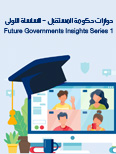
Future Government Insights - Series 1
Details
The COVID-19 pandemic has thrown governments and economies across the world into crisis management mode. We are now moving into year two of this crisis. This series of workshops gives an overview of the methods governments of the future can adopt to better prepare themselves to become more agile. Mohammed bin Rashid School of Government (MBRSG) is the first research and teaching institution focusing on public policy and effective governance in the Arab world and a part of the Government of Dubai. MBRSG is a member of the Principles of Responsible Management Education, an initiative of the United Nations Global Compact and we fall under the Mohammed Bin Rashid Al Maktoum Global Initiatives (MBRGI), “Empowering Communities” pillar.
Our faculty will provide you with a glimpse into the MBRSG Future Government programs, which are programs specially designed for employees with work experience and careers focused in the public sector or in large organizations focusing on delivery of public value. All our Future Government programs are at the Master’s level and are accredited by the Commission for Academic Accreditation (CAA) of the Ministry of Education's Higher Education Affairs Division in the United Arab Emirates.
The Master of Public Policy (MPP) program is designed to provide the unique opportunity to develop and demonstrate advanced intellectual and practical skills in Public Policy Development, Administration, and Evaluation. What is Public Policy? How is policy vital in times of crisis? How do we prioritize specific policies? We believe in providing students with the theoretical and practical knowledge to develop and apply the analytical tools necessary for high quality policy analysis and strategic development.
Learning Outcomes:
- To gain a better understanding of the connection between crisis management and public policy
- To learn about the different steps involved in public policy
- To inform your priority setting approaches and tools for policymaking
The age we live in, the Fourth Industrial Revolution or Industry 4.0 has become synonymous with new technology innovations. You have heard of many of these innovations countries are pursuing to become competitive: artificial intelligence, digital twins, DNA programming, 3D printing, augmented reality, drones, space exploration, robotics, smart cities - the list goes on. As we move into this exciting future, we are confronted with tremendous opportunities and huge responsibilities. What is a government's role in this tech-future? How do policy makers keep ahead of disruptive innovations?
Learning Outcomes:- Understand public value and its characteristics
- Explain the potential of tech
- Determine the impact of tech from a systems perspective
- Reaffirm tech’s role in global citizenship
“Change is inevitable, growth is optional” (John Maxwell). Change is a fundamental requirement for success in our modern world of volatility and discontinuity. To handle the unpredictability of the future, the public sector is required to strategically and sustainably develop change management policies for survival in these turbulent times. We only need to reflect on the past 12 months to recall the volatility that was precipitated by a global pandemic, which quickly redefined the economic and social landscape. We are all too familiar with the financial and emotional impact the COVID 19 pandemic continues to cause. Countries, organizations and individuals were either proactive or reactive in their response. Many entities are still grappling with the speed with which changes had to be implemented and how these changes will be embedded as the new normal in a post COVID world. While some entities have grown in their resilience and expertise in managing change, others are stuck in traditional, inflexible and monolithic structures. How can the public sector sustain the desired impact or results from change? How can public sector leaders make sure that the changes are not just episodic but that they are sustainable? What is a good model for embedding change and making it sustainable?
Learning Outcomes:- Define sustainable change
- Distinguish between Episodic Change and sustainable change
- Determine the factors that lead to sustainable change
- Explore a model for implementing sustainable change in the public sector
Speakers
Dr. Immanuel Azaad Moonesar R.D,Prof Melodena Stephens,Dr. Racquel Warner
 For an optimal experience, please
For an optimal experience, please



